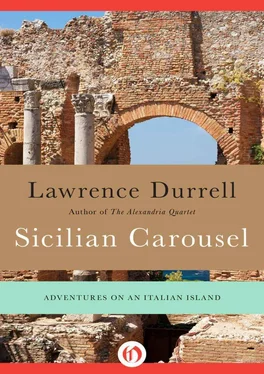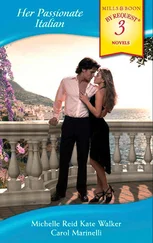Lawrence Durrell - Sicilian Carousel - Adventures on an Italian Island
Здесь есть возможность читать онлайн «Lawrence Durrell - Sicilian Carousel - Adventures on an Italian Island» весь текст электронной книги совершенно бесплатно (целиком полную версию без сокращений). В некоторых случаях можно слушать аудио, скачать через торрент в формате fb2 и присутствует краткое содержание. Год выпуска: 2012, Издательство: Open Road Media, Жанр: Путешествия и география, на английском языке. Описание произведения, (предисловие) а так же отзывы посетителей доступны на портале библиотеки ЛибКат.
- Название:Sicilian Carousel: Adventures on an Italian Island
- Автор:
- Издательство:Open Road Media
- Жанр:
- Год:2012
- ISBN:нет данных
- Рейтинг книги:4 / 5. Голосов: 1
-
Избранное:Добавить в избранное
- Отзывы:
-
Ваша оценка:
- 80
- 1
- 2
- 3
- 4
- 5
Sicilian Carousel: Adventures on an Italian Island: краткое содержание, описание и аннотация
Предлагаем к чтению аннотацию, описание, краткое содержание или предисловие (зависит от того, что написал сам автор книги «Sicilian Carousel: Adventures on an Italian Island»). Если вы не нашли необходимую информацию о книге — напишите в комментариях, мы постараемся отыскать её.
Sicilian Carousel: Adventures on an Italian Island — читать онлайн бесплатно полную книгу (весь текст) целиком
Ниже представлен текст книги, разбитый по страницам. Система сохранения места последней прочитанной страницы, позволяет с удобством читать онлайн бесплатно книгу «Sicilian Carousel: Adventures on an Italian Island», без необходимости каждый раз заново искать на чём Вы остановились. Поставьте закладку, и сможете в любой момент перейти на страницу, на которой закончили чтение.
Интервал:
Закладка:
Such was the prevailing good humor — and I am disposed to attribute this to Syracuse itself, for the whole place radiated good humor and mildness — that even the Bishop unbent and became almost expansive; he strolled over to us and asked Beddoes what he did for a living. “At the moment I am on the run from the police,” said Beddoes unexpectedly, and after a moment’s pained surprise we all laughed heartily at the supposed witticism. “I got flung out of Dunge-ness Junior for setting an exam paper which they said was far above the heads of the children.” The Bishop looked perplexed and concerned. “But there were other reasons too,” said Beddoes and gave his yellow smile. “For instance, my paper said ‘Enumerate all the uses of adversity and explain why the hell they are sweet.’” The Bishop’s wife beckoned him, and he left us with obvious relief. It was time to crawl aboard the little bus. Today there was no problem with our gear as we were staying in Syracuse for a couple of nights or so. There was simply the organization of the medical supplies and the lunchboxes of Mario and Roberto.
So we began to sidle down the inclined planes towards the little island of Ortygia, the original site from which the ancient Syracuse had grown up into a capital of 500,000 souls — a giant among ancient cities. There was not much traffic along the broad avenues but I was glad that Mario was taking things softly — I felt that there was something precious about the place and that one should not damage its atmosphere by rushing greedily about. The modern town has spread in a smeary way towards the landward side and the little island of Ortygia is slowly becoming depopulated, though for the moment it is full of tumbledown houses of great charm — like a little Italian hill village sited upon an ancient fortress. But the presence of water, of the blue sea, gave it radiance and poise. Like so many choice Greek harbors (Lindos, Corfu, Samos, etc.) it had been sited on a spit between two perfect anchorages; owing to the stability of the Mediterranean weather, and its predictability, one could always live upon a double harbor like this, confident that when the south wind blew the north wind packed up; there was always a good lee. So with Ortygia. It must have made an instant appeal to Greeks who had known the beauty and security of Lindos in Rhodes or Paleocastrizza in Corfu. The actual soil erosion in limestone lands must always produce this sort of configuration under the rubbing of the sea; I can think of dozens of such harbors and have often wondered whether the Cretan or Minoan symbol of the double axe was not a reproduction of this sort of ideal harbor.… Alexandria too had this to offer the sailor; the safe anchorage during the winter storms and the safe lay-by for the spring and autumn squalls brought by the changing equinoxes. I made a mental note to try this theory out on Roberto when next I got the chance; at the moment he was vaguely describing the streets through which we were passing as we moved towards the narrow causeway which led to the island.
“I have a nagging memory about the word Ortygia,” I told Deeds; “I think that somewhere I saw that it really meant ‘Quail Island’ and that it was one of the possible sites where Ulysses (always accident prone when it came to females) ran into a lot of trouble with Circe.” It would need the Lexicon to check this vague and irritating notion. Deeds said that in the islands off the coast of Turkey there were some small and remote ones famous for their quails; and that the women hunted them with a curious kind of little net like a lacrosse stick which had two large eyes painted on it. It resembled a strange savage totem. When the quails saw the eyes they crouched down and seemed hypnotized, and they were easily netted. He had often wondered whether this was an ancient survival, this curious hunting art.
Today, however, Quail Island was agreeably crowded with loafers drinking lemonade and waving to us as we passed over the narrow causeway and slowed almost to a halt in front of the Temple of Apollo — disappointingly battered and placed all askew with reference to the modern town in which it had got itself stuck — it seemed almost by accident. It had a forlorn benignity in the sunlight but it would need a very advanced state of rapturous romanticism to feel deeply moved by it. Mario drew rein for the statutory pause and himself rested with his forehead on his arms; he did not give poor Apollo as much as a glance. I think that he never had given it a glance or a thought. Was he right or wrong, I wondered? Here we were all politely craning our necks, while the more industrious had their noses buried in their guides. The bus had attracted a crowd of children who were equally indifferent to Apollo and found us much more interesting; they proposed to try and stick us up for the price of a drink. Negotiations were opened in a strange lingua franca which seemed part Swedish and part English. They did not get very far, for suddenly, like a lion waking and bounding from his lair, Mario rushed out of the bus and after them with a deep and frightful growling which sent them rushing widdershins. It was as decisive as the Battle of Himera, the enemy forces were scattered and ran screaming down the side streets while Mario with a grin like a harvest moon, regained the bus and started up the motor again.
Deeds’s Guide was all carefully marked up with symbols which strongly suggested the Sikel alphabet or Linear B. Intrigued, I asked him what they represented. “I am evaluating my own Sicily,” he said. “There are four terms, four values for the monuments. Together they form the word Moss. M is for must, O is for ought really, SH is for should really, and SK is for skip. Over the years my taste has varied a little but not so much. I see for example that for old Apollo I have given him an ‘ought really’.… We can’t afford to skip him outright on historical grounds, but he doesn’t invigorate one. But just you wait a moment.” I waited and it was not for long, for Mario crawled down a couple of streets so narrow that we could have touched the walls without leaning forward — and at last into the fine airy cathedral square. It was not only spacious but it was smothered in oleander blossom — full-grown trees this time and in full flower. It was no surprise in this halcyon air to hear a girl singing, the cooing of doves, and the brisk clip-clop of the little colored fiacres which plied for hire in this enchanted corner of Quail Island, as I dared to call it in my own mind — until either Liddell or Scott or both told me I was all wrong. We drew up outside the cathedral and Roberto had a sudden access of hopelessness. “There is so much to tell,” he said wringing his hands at the immensity of the task, “we should really stay a week or a month.… But the important thing is to look first!”
It was a happy injunction, and we clambered down from the bus in a sunshine fragrant with flower smells to follow him into the deep booming warmth of the old church which was surprising and unreal — and above all sublimely beautiful. One felt that little knock at the heart which told one that we were really visiting the heart of the island — the quick or quiddity of Sicily. Why is it so astonishing a place? It takes a moment’s thought and a hundred paces down the side street to analyze its singularity. For the ancient Greek temple, or what remains of it (the remains are really considerable), has been comfortably and capaciously cocooned in the Christian edifice without attempting to disguise the modernity of the successor to Gelon’s noble construction.
You would think that this simple but daring idea would result in a dreadful fiasco. But you are astonished to find the result deeply harmonious and congruent; it has a peaceful feeling of inevitability, as if it had been achieved during sleep, unerringly. I think everyone in the party felt a strong tug of admiration at these fine proportions, and the simple dignity of the whole conception. It was also a sort of living X-ray of our whole culture, or let us say, the history of the religious impulse in one vivid cross section. Usually the age that succeeds manages to smash everything and sweep it, if not under the carpet, at least into the new construction. Here we were standing on a spot which had been consecrated ground before the Greeks, then during the Greek reign, and finally for the Christians.… The past had been not razed but accepted and accommodated with reassuring tact and ampleness. I felt suddenly like chuckling as I walked about inside this honeycomb — so full of treasures, a real Ark of the human covenant. For the first time in my life I didn’t feel anti-Christian. Roberto must have been used to seeing the impact of this lovely spot upon his tourists for he did nothing, said nothing, just stood by with his hands in his pockets, waiting to brief us when we so desired.
Читать дальшеИнтервал:
Закладка:
Похожие книги на «Sicilian Carousel: Adventures on an Italian Island»
Представляем Вашему вниманию похожие книги на «Sicilian Carousel: Adventures on an Italian Island» списком для выбора. Мы отобрали схожую по названию и смыслу литературу в надежде предоставить читателям больше вариантов отыскать новые, интересные, ещё непрочитанные произведения.
Обсуждение, отзывы о книге «Sicilian Carousel: Adventures on an Italian Island» и просто собственные мнения читателей. Оставьте ваши комментарии, напишите, что Вы думаете о произведении, его смысле или главных героях. Укажите что конкретно понравилось, а что нет, и почему Вы так считаете.











